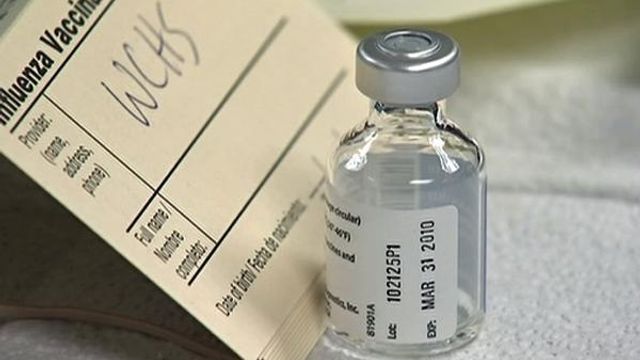Wake to open H1N1 clinics to all
Wake County public health officials said Monday that, beginning Tuesday, anyone over 6 months old can receive an H1N1 vaccination at immunization clinics scheduled across the county this week.
Posted — Updated"For the last two months, we have focused on providing the H1N1 vaccine to people in priority groups, understanding the importance of taking care of those at highest risk of developing complications if they become sick with H1N1 flu first,” Community Health Director Sue Lynn Ledford said in a statement. “Looking at our current data, including the most recent information from private medical care providers, it is time to move forward and begin vaccinating all people in Wake County.”
Clinics are scheduled from 9 a.m. to 4 p.m. Tuesday, Thursday and Friday and 9 a.m. to 7:30 p.m. Wednesday at the Public Health Center on Sunnybrook Road in Raleigh, the Southern Regional Center on North Judd Parkway in Fuquay-Varina, the Northern Regional Center on East Holding Avenue in Wake Forest and the Eastern Regional Center on Dogwood Drive in Zebulon.
The clinics will offer the FluMist nasal spray vaccine to healthy people ages 2 to 49. The injectable form of the vaccine will be available only to people who can't receive the nasal vaccine: pregnant women, children between 6 months and 2 years old and anyone with chronic medical conditions.
“We strongly encourage people to first look to their private care providers and pharmacies to receive this vaccine," Ledford said. "Over 119,800 doses have been distributed primarily to pediatricians, obstetricians and chain pharmacies in our community.”
Another reason for opening H1N1 clinics to everyone is the onset of the seasonal flu season, and the possibility of the two influenza strains merging. Ledford said the best way to avoid complications is to get vaccinated.
“If we can keep those two flu patterns from merging in such a dramatic way, we hope to lessen the impact on the community,” Ledford said.
Song Nyguen and three of his children received the H1N1 vaccination on Monday. Nyguen still has one son that won’t be protected against the virus.
“He has asthma, and also he's allergic to eggs, so he can't take the flu vaccine of any kind,” he said. “For us to be protected, we're protecting him in the process.”
State Epidemiologist Dr. Megan Davies said last week that no statewide policy has been set for making the vaccine for the H1N1 flu virus more widely available, but some counties have sufficient supplies to move beyond the high-risk groups that have been receiving vaccinations in recent weeks.
Officials initially restricted vaccinations to pregnant women, children between the ages of 6 months and 24 years, anyone caring for an infant younger than 6 months old and emergency and health care workers.
Davies said she doesn't think everyone in high-risk groups has been immunized against H1N1, noting some have chosen not to be vaccinated and others were likely scared off by long lines.
State officials could still shift vaccine stocks between counties as needed if some continue to have trouble meeting demand, especially among high-risk groups, Davies said.
• Credits
Copyright 2024 by Capitol Broadcasting Company. All rights reserved. This material may not be published, broadcast, rewritten or redistributed.






